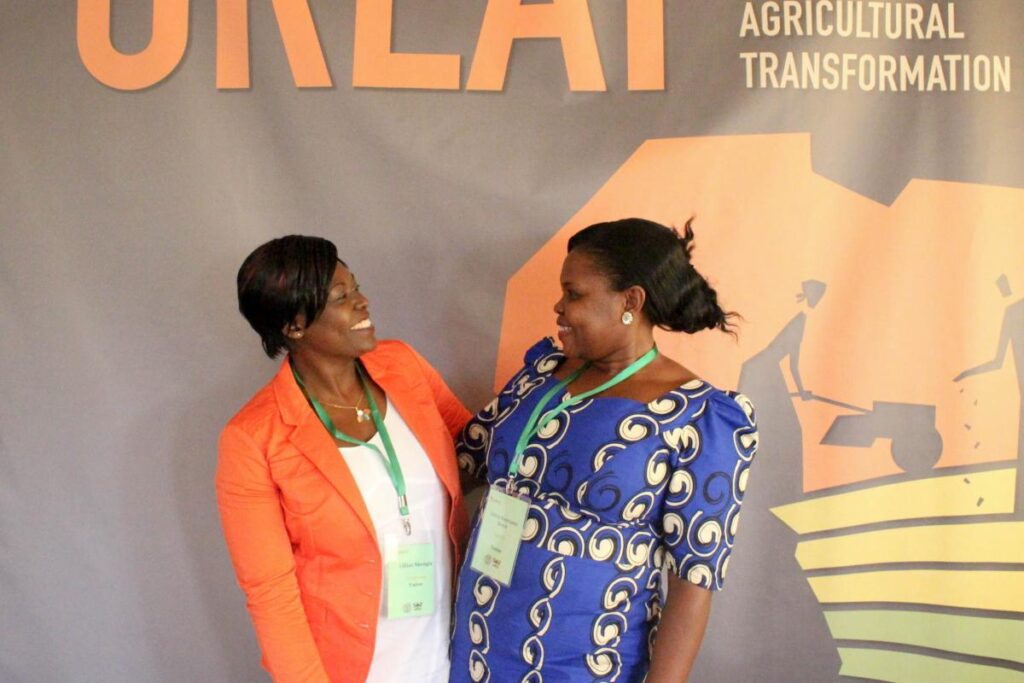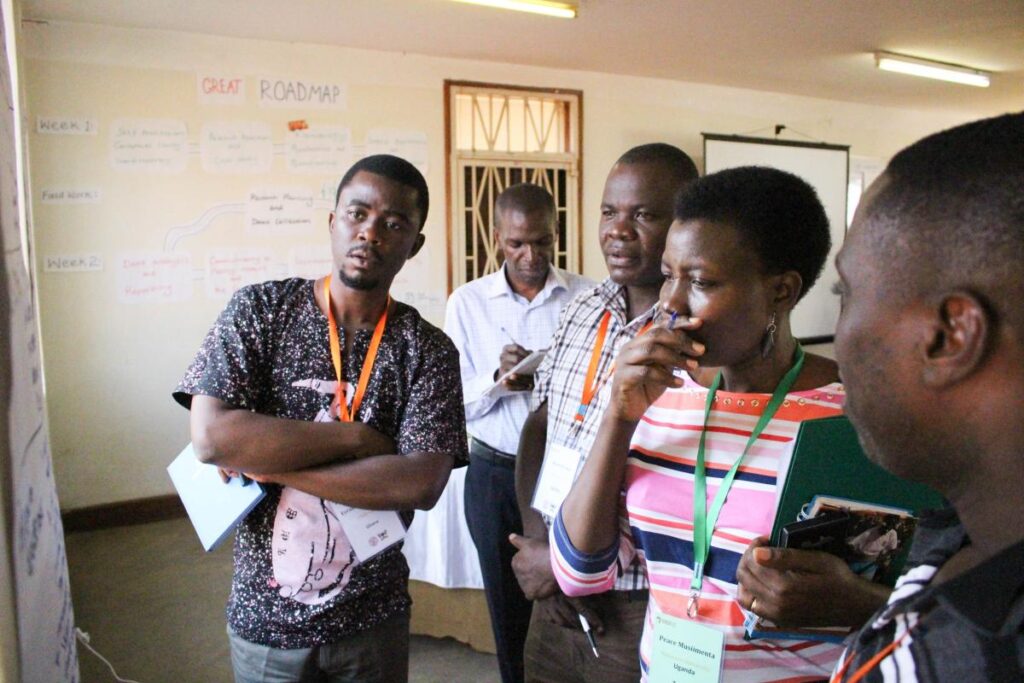By: Kerry Mullins, GREAT Intern, and Devon Jenkins, GREAT Project Manager
For Lilian Nkengla, the start this week of the GREAT Gender-Responsive Cereal Grains Breeding course will be both familiar and completely new.
As a participant in the first GREAT course last year, Nkengla, from Cameroon, worked alongside her colleague from the International Institute of Tropical Agriculture (IITA), Aman Bonaventure Omondi through the classroom and field portions of the training, as they deepened their knowledge and skills in gender-responsive agricultural research theory and practice. Now, in a brand new role with GREAT, Nkengla herself will help guide and shape the experience for the next course’s participants.

Lilian Nkengla (left) and Losira Nasirumbi-Sanya at the GREAT Theme 2 training in August, 2017
“It’s an exciting opportunity to be involved with GREAT again, this time being able to help shape the course for new participants”, said Nkengla during pre-course preparations in Kampala. Word of Nkengla’s new role has gotten out to her host institution, and was shared on the IITA website a few days before the start of the course, in an IITA news story.
Nkengla, along with fellow participant from the first GREAT cohort, Losira Nasirumbi-Sanya, from the National Agricultural Research Organization (NARO) in Uganda, was selected as a GREAT Sub-Saharan Africa Gender Specialist Fellow. This role emerged out of a desire to identify promising gender specialist participants from each cohort, and provide them with further opportunities for career advancement.
“From our first course we knew that we wanted to create an avenue for these promising gender specialists to really take their knowledge and careers to the next level”, said Margaret Mangheni, the GREAT projet co-lead, based at Makerere University. “Not only will we support them to get additional training, we’ll also be able to draw on them to make GREAT a better program.”
As part of their fellowship, both Nkengla and Nasirumbi-Sanya will receive funding and support to pursue in-depth gender training over the next year, in addition to acting as co-leads for the new GREAT course. Furthermore, both will serve as members of GREAT’s Community of Practice Advisory Board, helping build a network of practitioners working to shift the culture within the agricultural research community in Africa.
Leading up to this week’s course, Nkengla and Nasirumbi-Sanya joined the GREAT training team for a two-day curriculum review workshop, and already their impact was being felt. According to Hale Tufan, the Cornell University-based project co-lead, “having them both in the workshop was terrific, as they brought experience from their time as GREAT trainees, and gave insightful input when we discussed technical content for the upcoming course. We’re all excited to have them with us for this next course…and beyond!”
Theme 2 GREAT course underway
This year’s GREAT course, Gender-responsive Cereal Grains Breeding, will take place in two phases at Makerere University in Kampala, Uganda – a first training module
focused on theory, methods and tool development, August 7-16, followed up with a second module on data analysis and institutional transformation, January 15-19, 2018. In between the two modules participants will field test the tools and methods they’ve learned in the context of their existing research projects, with support from GREAT Field Trainers.

Theme 2 participants and trainers react to a team’s presentation developing their project’s case study
Participants in this year’s GREAT course, focused on cereal grains breeding, cover a broad cross-section of African agricultural research, with 32 researchers in 13 participant teams, covering a wide range of African countries, including Ghana, Niger and Nigeria in West Africa, and Burundi, Ethiopia, Kenya, Madagascar, Malawi, Rwanda, Tanzania, Uganda and Zambia in East and Southern Africa.
Teams represent a wide range of institutions, including Uganda’s National Agricultural Research Organization (NARO), the Kenya Agricultural and Livestock Research Organization (KALRO), the West African Center for Crop Improvement (WACCI), Nigeria’s Lake Chad Research Institute (LCRI), Ghana’s Council for Scientific and Industrial Research-Crops Research Institute (CSIR-CRI), Uganda’s Makerere University, the Ethiopian Institute of Agricultural Research (EIAR), the Institut des Sciences Agronomiques du Burundi (ISABU), Institut National de la Recherche Agronomique du Niger (INRAN), Tanzania’s Ministry of Agriculture, Livestock and Fisheries (MALF), and AfricaRice.
The Theme 1 GREAT course, focused on roots, tubers, and bananas (RTB) took place in Kampala, with training modules in September 2016 and February 2017.





